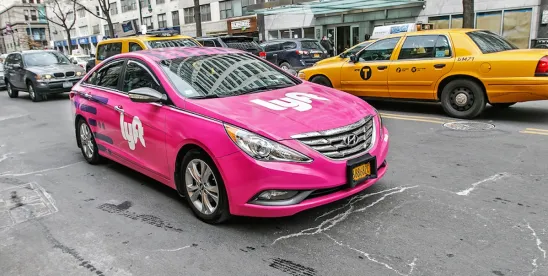After years of battles within the state over ride-share driver classification issues, California is redrawing the map of gig-economy labor relations – a measure that would, for the first time in the state, give unions a path to organize rideshare drivers. California Governor Gavin Newsom is framing the bill as the result of a compromise that includes long-sought insurance reforms aimed at lowering fares and making rides more affordable for Californians. It’s worth noting that as recently as 2020, 87% of drivers reported they supported Proposition 22, which classified them as independent contractors outside the reach of the unions in California (read more of our coverage of the Proposition 22 ballot measure here, here, here, and here).
On August 29, 2025, Newsom, announced that the California Service Employees International Union (“SEIU”), Uber Technologies Inc, and Lyft Inc. now jointly support Assembly Bill 1340 — a measure that would, for the first time in the state, give California’s rideshare drivers a statewide path to unionize, while remaining independent contractors. Governor Newsom also threw his weight behind Senate Bill 371, which would lower the minimum uninsured/under-insured motorist coverage Transportation Network Company (TNC) drivers must carry, trimming a costly compliance burden.
AB 1340: Potential Pathway for Statewide Union Representation of Ride-Share Drivers
Under AB 1340, every TNC operating in California must turn over to the Public Employment Relations Board a roster of drivers who have provided at least 20 rides in the preceding six months.
A union showing just 10 percent support among active drivers for a specific company could then seek to organize the rest, armed with that contact information; it then needs to have support from 30 percent of those active drivers to become the certified statewide bargaining representative. If multiple unions top 30 percent but none secures an outright majority, the Board will order a representation election. This may mean that a union could represent ride-share drivers without holding an election and with only 30 percent of active drivers– far less than a majority of all drivers.
Once certified, a union enjoys a one-year challenge-free window — or up to 3 years, while a CBA is in force. Decertification of the union requires at least 30 percent of active drivers to petition the Board, which would trigger another election. The bill mandates that the bargaining unit encompass all drivers statewide (active or otherwise) and imposes a good-faith bargaining duty on every TNC with a certified union.
Takeaways
For employers, this legislation could quickly become the national template for other states to adopt. This would pave the way for more robust gig-worker union representation, who are currently independent contractors and thus not statutory employees under federal law (i.e., the National Labor Relations Act).
Massachusetts adopted a similar model by referendum in 2024 – although a key distinction there was that the voters decided whether to pass the legislation by referendum, whereas here the California legislature will – and other jurisdictions are watching closely.
If adopted, AB 1340 could compel rideshare platforms to recalibrate labor strategies, enhance HR infrastructure for statewide negotiations and, potentially brace for increased labor costs. SB 371, meanwhile, offers an offset by reducing required uninsured/underinsured coverage, easing one of the sector’s more expensive compliance line-items.
California’s legislature is still vetting AB 1340, but with bipartisan momentum and backing from both industry and labor, it appears on the fast track to passage. But an open question remains whether a majority of the ride-share drivers support this bill and the practical impact on this workforce if it were to pass, and unions begin organizing under this proposed standard. Employers should begin planning for union elections, review data-sharing protocols, and prepare negotiation playbooks. The road to organized rideshare labor has never been clearer—or closer.





 />i
/>i

